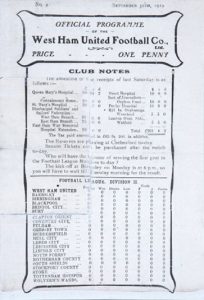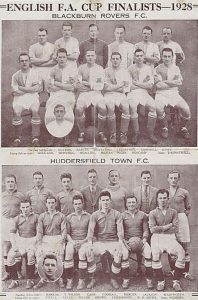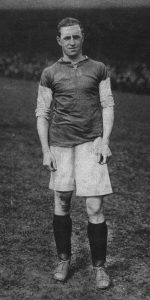By Vince Cooper
HERE are a couple of great quiz questions;
Q: Name the two clubs involved in the first-ever £5,000 transfer fee.
A: West Ham United and Falkirk
Q: Name the buyers
A: Falkirk
If you got those two right there’s every chance you know a little about Syd Puddefoot, the man who moved to Scotland from London’s East End in 1922 in a transfer that shocked football to its core.
Every record transfer move until then had seen the player end up at an English club but Falkirk and Puddefoot changed all that. So, who was Syd?
Sydney Charles Puddefoot was born in Limehouse in London’s East End in October 1894, one of 13 children only five of whom survived childhood. He attended Park House School in West Ham and first played for local teams Condor Athletic and Limehouse Town before joining West Ham, then of the Southern League in 1912. The Hammers had been keeping an eye on the local lad and finally signed him after an impressive performance for London Juniors against Surrey. He spent a year as an amateur at the club while continuing to work as an accounting clerk.
In that amateur year Puddefoot, understudying Danny Shea, made his debut in a 2-1 win over Norwich City where George ‘Gatling Gun’ Hilsdon, having returned to the club from Chelsea, got both goals. He went on to make four starts in that his season, scoring once, in a match against Brighton.

Action against Chesterfield
The following season, with Shea having been sold to Blackburn Rovers for a then-record £2,000, the man who became known, affectionately, as ‘Puddy’, now aged 19, increased both his appearances and marksmanship with nine goals in 16 Southern League matches and a further seven in four FA Cup starts, five of those coming in the 8-1 First Round thrashing of Chesterfield Town, including a seven-minute hat-trick.
He formed half of a new attacking double-act with Richard Leafe, who the club had bought from Sheffield United and The Hammers, despite the sale of Shea, seemed well set up front.

In the early stages of the 1914-15 season Puddefoot cracked in a hat-trick against Exeter City and a newspaper report claimed that he; ‘outshone every other forward on the field.’ The Hammers would go on to finish in 4th place, seven points behind Southern League champions Watford and ‘Puddy’ found the net 18 times in 35 games.
The Great War broke out in 1914 and Syd spent most of it working at a munitions factory which made him available for the Hammers London Combination matches where he scored an amazing 100 goals in 114 games with his team winning the competition, which included First Division clubs Spurs and Chelsea, in 1916-17. Late in the conflict, Puddefoot was called up to the army and spent some time stationed at Bridge of Allan in Stirling and just 15 miles from Falkirk where, significantly he made some guest appearances for The Bairns.

West Ham’s first Football League match
After peace came West Ham joined the Football League and Puddefoot, after failing to net in the club’s first-ever league match against Lincoln City, was top scorer in the 1919-20 season with 26 goals. In 1920-21 he found the net 29 times to finish as the division’s top scorer as The Hammers rose from 7th place in their debut campaign to 5th. He also played in three victory internationals for England in 1919, scoring three in two matches against Scotland and once in a 2-1 defeat to Wales.
In the 1921-22 campaign he had scored 14 times by February and was reportedly wanted by any number of big-name clubs including Spurs, Arsenal and Chelsea. When Falkirk enquired after his services. Hammers boss Syd King quoted an unprecedented £5,000, in his own words; ‘just to frighten them off’. To his complete amazement Falkirk agreed, raising the money through public bonds offered to fans (which actually netted £6,000) and reportedly bringing the fee to London in cash.
West Ham supporters were irate at the loss of their star but the club, perhaps hoping to avoid some of the backlash blamed the player claiming in a statement that he wanted the move because he would be ‘branching out in commercial circles in Falkirk’ although Puddefoot insisted that The Hammers were keen for the deal to go through.
The club went as far as to state in their programme for the match against Hull City shortly after the sale; ‘It is an old saying that everyone has one chance in life to improve themselves and Syd Puddefoot is doing the right thing for himself in studying his future.’
The fee brought about some alarmed comments in the press. The Athletic News wrote; ‘When will this folly of football clubs come to an end?
‘This is not the first time by any means that we have denounced this mad speculation in players – mad because of the reckless expenditure and the risk which players, good, bad and indifferent, run of terminating their career in any match.
‘What is to be the limit? Is there to be a limit?’
Whilst West Ham slipped out of the running for promotion after his departure, Puddefoot, on his arrival in Scotland, received ‘A welcome fit for a king’ with crowds cheering him all the way from the station to his lodgings.
The player did not have the best of debuts as his new club suffered a Scottish Cup defeat to Bathgate at Creamery Park. Carrier pigeons brought news of the shock defeat back to Falkirk.

Falkirk, Puddefoot with the ball at his feet
But Puddefoot, who had insisted that the transfer of his brother Len to Scotland be part of the deal, received glowing reviews in the local press with the Falkirk Herald invoking the spirit of William Shakespeare, gushing; ‘His fine distribution of play, his passing to the wings with mathematical accuracy, his clean, clever, gentlemanly way of getting round an opponent and his deadly drives for goal displayed, as Hamlet says ‘a combination and a form indeed.’ He is, without doubt, a footballing genius.’
After the cup loss, Syd inspired his new team to a fifth-placed finish in the 1st Division, up from 17th the year before.
However he didn’t seem to have a great time north of the border and later complained that his teammates refused to pass to him whilst local fans turned against him. The player later claimed; ‘My offence, as far as I can see, is an English accent.”
Despite clearly being homesick (he once missed a match to play county cricket for Essex), he managed 45 goals in three seasons with The Bairns.
Having been assured on numerous occasions that he would be allowed to move back to England he finally got his wish in February 1925 when Falkirk accepted a £4,000 offer from relegation-threatened Blackburn Rovers.
Puddefoot made an immediate impact on his new team, netting the only goal of the game against Arsenal and giving Rovers their first win for seven weeks. Blackburn would go on to finish the season in 16th, nine points clear of the drop.

Blackburn Rovers 1925-26. Puddefoot back row, far left.
Whilst at Ewood Park he won two England caps in 1925 and 26. The first came in the goalless draw against Northern Ireland in Belfast and he was then part of the team, alongside former West Ham teammate Jimmy Ruffell, that lost 1-0 to Scotland at Old Trafford. He was already 31 when making his debut and missed out on his best chances of racking up England caps when the selectors ignored him during his time in Scotland.

The 1928 Cup final teams
Now aged 34, Syd played a major role in Rovers’ run to the cup final in 1928, scoring four times and he was a key part of the team that won the trophy as underdogs against Huddersfield Town, laying on the first goal for Jack Roscamp in a 3-0 success.
He courted controversy when, during an October 1929 clash with Bolton at Burnden Park. Having scored to give his team the lead in the opening half, he saw Wanderers equalise then go in front with just three minutes left. In the last minute Puddefoot was sent-off for what the referee described as; ‘a deliberate kick at Nuttall’.
Appealing against the decision and claiming it was a case of ‘mistaken identity’, Pudefoot attended a hearing in Sheffield (the first player to be allowed to state his own case personally) but the FA commission stuck with the referee and suspended him for 14 days.
Puddefoot spent a total of seven years with Blackburn scoring 87 goals for the Lancashire club before in February 1932, at the age of 37, he returned to West Ham ten years after leaving the club to aid their fight against relegation. But he could do little to help The Hammers’ slide towards the 2nd Division and they finished bottom of the table.

He spent another season at Upton Park and scored on his final start, a 1-1 draw with Preston on 6 March 1933 to finish his playing career with over 250 goals for his three clubs.
After an application to manage Blackpool was turned down, Puddefoot next accepted an offer to work in Turkey as assistant at Fenerbahce but he fell out with manager Joszef Schweng and moved across the city to fierce rivals Galatasaray.
However his time in Turkey came to a premature end after a clash between the two teams in February 1934.
During the match a brawl broke out between opposing players. The referee repeatedly blew his whistle in an attempt to break things up but he was ignored and Puddefoot tried to break the fight up but was ‘mauled and manhandled’ as fans came onto the pitch followed by the police. The outcome of the incident was the suspension of 17 players, including one for life, and the return to England of Syd.
On his return, Puddefoot spent some time working as an FA coaching instructor to secondary schools in Kent before taking up an offer to manage Third Division (South) Northampton Town. He won 41 of his 91 matches in charge before resigning in March 1937 after a disagreement over club policy.
He later admitted that managerial life was not for him, saying in the 1960s; “I found that the manager’s position was noted for it’s insecurity, and it still is.
“And it was then I decided to leave football.”
Puddefoot moved back to his adopted home of Blackpool and spent the World War Two years working as a constable with the Blackpool Borough Police. He then took a job with the Ministry of Pensions although he kept in touch with the game by scouting for Southend United and was invited to attend the 1960 Cup final and post-match banquet by Blackburn.
He passed away after contracting pneumonia in 1972 just before his 78th birthday.
Syd Puddefoot certainly had a fascinating career. Transfer record-breaker, England caps, FA Cup winners medal, overseas coaching, goals galore

